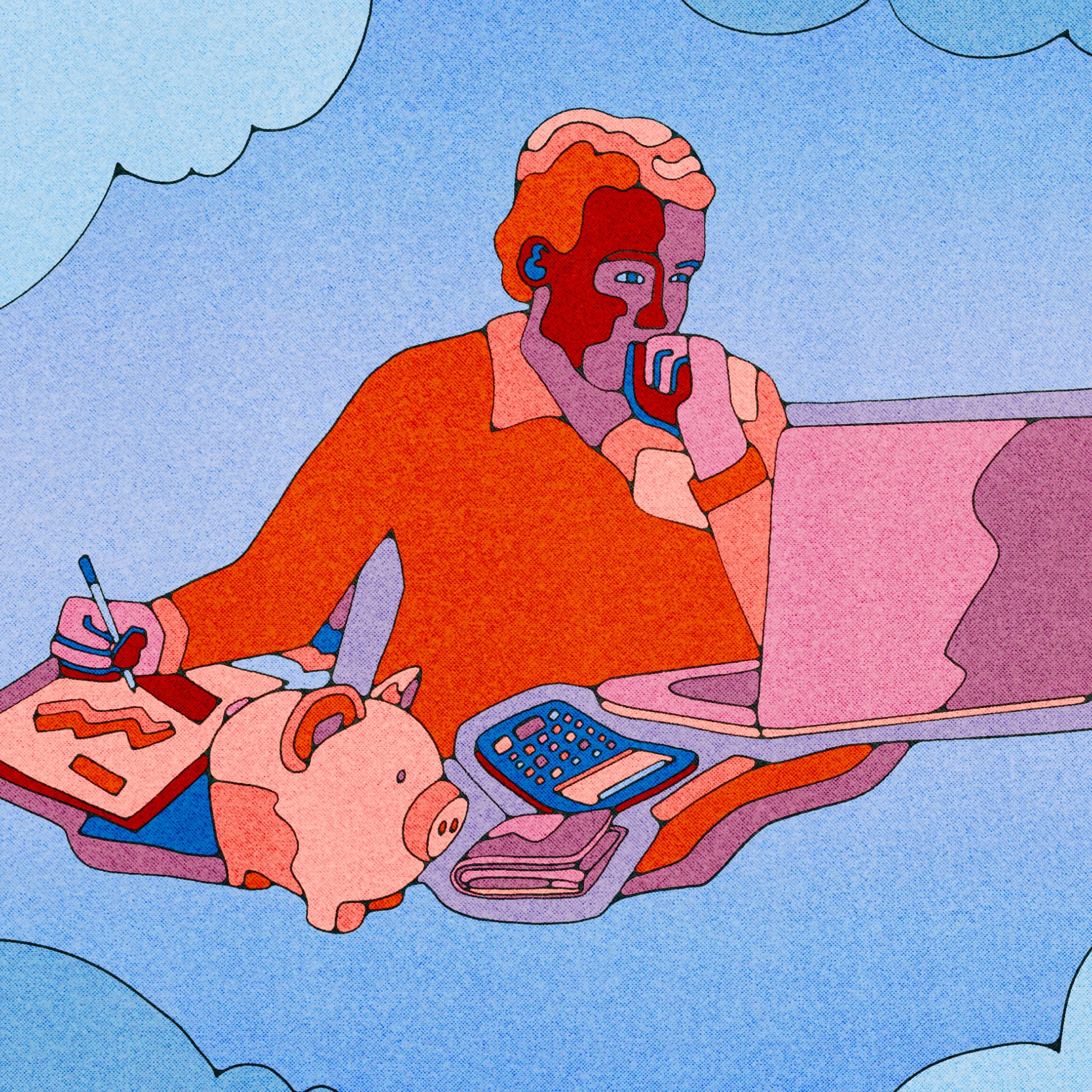Finance for Humans
Inflation Panic 2021! What It Means, What To Do
Maybe you saw that inflation numbers were high (really high!) last month. Or that the market went down — and then maybe, so did your portfolio. Here’s how inflation works and what you should do about it.
Wealthsimple makes powerful financial tools to help you grow and manage your money. Learn more
Some people were shocked at the (super!) high inflation numbers that came out recently. Other people waited until the threat of inflation caused the market (and their investment portfolios) to go down before they were shocked. How worried should we be? What’s going to happen? We sat down with Ben Reeves, Wealthsimple’s Chief Investment Officer, to discuss how inflation works and what, if anything, you should be doing with your money right now.
In the last few months, it seems like inflation has been extremely high. The numbers that came out recently showed that US prices in June were 5.4% higher than the previous year. In Canada, they were 3.6% higher as of May. Safe to say, some people are freaked out. What did you think when you saw the numbers?
Well, I have a boring answer: I’m not usually shocked by economic numbers. The world is full of uncertainty, which is why it’s both scary to invest and why you make money when you invest.
But simply speaking, is that a really big number for inflation?
The short answer is yes. The longer answer is that this is just one month’s number, and this one’s a number that’s particularly hard to parse. Inflation is a measure of how much things cost — or, another way of saying it, how far a dollar goes. And a dollar definitely buys less now than it did a year ago. But what that change means is complicated. There was a historic change in spending patterns from last year to this year. People were literally forced to stay home a year ago, which had all kinds of effects on spending. So while the change in how much things cost is big, you have to remember what you’re measuring it against.
On one hand, I wouldn’t say that number is a super accurate picture of what’s going on across the whole economy. But on the other hand, it does make sense that inflation is going up — just the level of stimulus and spending by the government would mean a decent rise. The question is whether the level of inflation is transitory — caused by short-term things like stimulus and how depressed spending was a year ago — or whether it will be more long-lasting.
When inflation began to go up, a lot of people saw the value of their investment portfolios go down. Now, the markets have recovered. What happened?
Well, how the market reacts to inflation depends on whether it thinks inflation is permanent or temporary. If it’s permanent, inflation is bad for profits because companies' costs rise, and they often can't raise prices enough to cover those new costs entirely, so profits go down — and when profits go down, so do share prices. Second, it often leads to higher interest rates, and that makes stock prices go down. Why? Higher interest rates raise the cost of borrowing, which makes people borrow less. Borrowing less means people are spending less, and corporate profits suffer.

Sign up for our weekly non-boring newsletter about money, markets, and more.
By providing your email, you are consenting to receive communications from Wealthsimple Media Inc. Visit our Privacy Policy for more info, or contact us at privacy@wealthsimple.com or 80 Spadina Ave., Toronto, ON.
How do you figure out if it’s just a blip?
It’s clear that part of the current inflation is transitory. There’s a huge surge in demand from re-opening and Covid relief payments. But there are also some factors that make inflation more of a longer-term risk. It’s generally more accurate to look at two things — the price of inflation-linked bonds and what economists are projecting — than it is to look at monthly inflation data. Right now, both of those indicators are telling us that they expect inflation to have a temporary spike and then, after that spike, to ease a bit but remain higher than it has been in recent history.
If we know inflation is real, what does that mean for the markets? Doesn’t that mean we’re looking at a bear market for equities?
Generally speaking, inflation surprises aren't great for most financial assets, but it can be complicated and hard to predict.
But as far as what’s going to happen, remember that markets aren’t really a snapshot of the present. They’re a picture of what people expect to happen in the future. What it means for asset returns depends on how the future transpires relative to what's expected. And inflation is not necessarily bad if it is being caused by high growth as long as it doesn't get out of control.
What would you do to your portfolio if you’re worried about inflation? Are there assets people should think about buying (or selling) based on what’s going on with inflation?
The first thing you should do is be clear about your strategy: are you trying to beat the market by predicting inflation? Or are you putting your investments into a diverse set of assets that you hope will perform well over long periods of time? If you’re investing for the long-term, you shouldn’t be surprised that inflation goes up from time to time, and you should probably do nothing.
Recommended for you
That said, when people build their long-term investment portfolios, they often build in some assets that traditionally do well when inflation is high: gold, inflation-linked bonds, commodities, and real estate. (That’s what we do at Wealthsimple; we include gold in all of our portfolios.) And it’s important to use a good risk model when you are sizing your inflation hedges because nothing is a pure hedge. All of the hedging assets come with other risks, like interest rate risk or equity market risk, that you need to account for.
OK, let’s TLDR here. If you’re trying to grow your money (i.e. are a person), what are the pluses of inflation? And what are the minuses?
Let’s start with pluses:
The inflation right now is an indication that the economy is growing, which is good for almost everyone.
Some inflation is caused by wages going up, which isn’t all bad news — when businesses need to hire lots of people and employees can demand more, they have to pay more. If you don’t use those extra wages to buy stuff and save it instead, it can be a plus.
If you have debt, inflation reduces the value of that debt.
Now the minuses:
Your cash and financial assets are worth less in terms of stuff you want to buy.
Too much inflation, or too much volatility around inflation, can make it hard to run a business because long-term contracts become riskier. But we’re a long way away from that being a problem currently.
Wages don’t usually keep up with inflation in an inflationary period, so your ability to buy things may be impaired.
As someone who gets a lot of their news (and needlessly confrontational opinions) from Twitter, I’ve been hearing a lot that — and I’m paraphrasing here — inflation really isn’t a problem anymore. That it’s been kind of solved. Does this mean those people are wrong, slash, are idiots?
It’s true that inflation has been declining for decades. That’s mostly because of some big trends like globalization and a lot of technological change. That’s why a lot of commentators have been encouraging governments to just print money and get people to work.
On Twitter, the phrase I see the most for that is, “make the money printer go brrr.”
Yep. But I think, like many things on social media, nuance gets stripped away. I think the thoughtful argument for “money printer go brrr” is: when you weigh the risk that inflation will rise because the government put too much money into the system against the risk of damage from doing too little to help the economic system, the inflation seems less dangerous. That makes sense to me.
I have a friend with one of those high-net-worth money managers. And this money manager’s take is that inflation is part of the business cycle, and you should shift your investments around according to where we are in the business cycle so you can keep making money. Is that a good idea?
First, yes, inflation is tied to the business cycle. And yes, there are assets that do better or worse at different stages of the business cycle. If you can predict the business cycle precisely, you can make money. But remember that markets are already priced according to what people think is going to happen. So if you’re going to make money with this strategy, you not only have to know where you are in the business cycle, you have to be correct and early. As a rule of thumb, once something is in the newspaper or on TV, you are probably too late. And if you’re wrong, you’re in trouble.
I generally think it’s hard for anyone, professional or retail investor, to pull this off. At Wealthsimple, we don’t like making predictions, as history has shown us that predictions relative to what’s priced into markets are often wrong. We design our portfolios with a mix of assets, some that outperform when the business cycle is booming, like global stocks, and some that outperform when the economy is struggling more, like bonds and higher-quality stocks, to help people grow wealth in the long term.
I’m not surprised you’re saying DO NOTHING, STAY THE COURSE. It’s what you always say. But what about if you’re getting close to retirement and there’s not enough time to rebound from an inflationary period?
I think that’s a good point, and we often work with retirees to put some inflation hedges — like gold, inflation-linked bonds, and commodity equities — in their portfolios. It’s important to size those positions correctly and to consider the full package of risks you are getting from those assets.
In our standard portfolio, we have some inflation hedges — when rates got low, we swapped our inflation-linked bonds for gold because medium-term bond rates were less of a two-way bet at that point — but the core of our portfolio is to make money from globally diversified stocks, which should be OK over the time periods relevant to our investors.
This article was last updated July 13, 2021.
Wealthsimple's education team is made up of writers and financial experts dedicated to making the world of finance easy to understand and not-at-all boring to read.









